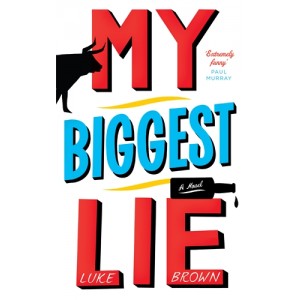 Liam, the narrator of Luke Brown’s My Biggest Lie, is a young, hip, glib, literary type with a taste for illicit substances and a precarious relationship with the truth. He has just been dumped by his girlfriend, Sarah, and in the eyes of the world, is responsible for the death of literary megastar, Craig Bennett. Liam met Bennett only once but has retrospectively elevated him into a beloved friend and the only one who truly understood him.
Liam, the narrator of Luke Brown’s My Biggest Lie, is a young, hip, glib, literary type with a taste for illicit substances and a precarious relationship with the truth. He has just been dumped by his girlfriend, Sarah, and in the eyes of the world, is responsible for the death of literary megastar, Craig Bennett. Liam met Bennett only once but has retrospectively elevated him into a beloved friend and the only one who truly understood him.
Fired from the publishing job he loves, Liam flees in ignominy to Buenos Aires, Bennett’s spiritual home and the place he wrote most of his novels. Here he holes up in a backpacker hostel, and, in-between boredom-fuelled bouts of drinking, drugs, sex and the pursuit of sex, proceeds to write both a novel inspired by Bennett’s history and a very long, meandering letter to try and win Sarah back.
Brown employs a light tone in attempting to tackle some big themes, such as love, loyalty, absent fathers and self-knowledge, and is ambitious in his exploration of the interplay between reality and fiction. This is also a very funny book, with some wonderful self-deprecating asides and delightful touches of absurdism—the depictions of Argentinian machismo, for example, and the hostel bookcase filled almost entirely with Alex Garland novels and copies of The Alchemist.
There were a few elements I struggled with, however. At times, the plot felt a little aimless, lacking peaks and troughs, so that what should have been pivotal events slipped by like just another bottle of Argentinian wine (although, in fairness, this may have been a reflection of the almost fugue state Liam was in for most of the novel.) The characterisation also felt a little underdeveloped in some areas: Liam’s disingenuousness, for example, is presented as both his fatal flaw and the main catalyst for conflict in the book, but I felt that this trait wasn’t established strongly enough to justify the degree of damage it caused. Liam’s relationships with several supporting characters also seemed psychologically inconsistent, vacillating almost arbitrarily between comradeship and lust.
Overall, however, this is an insightful and entertaining novel which many readers will enjoy, especially those with an interest in writing and the world of publishing.
Leonie Jordan is a former bookseller and English teacher, now working as a children’s librarian.
